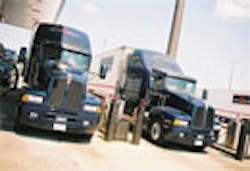With the price of fuel ever on the rise, fleets are more likely to weigh different approaches to managing this volatile cost. Among the latest is GasLimit, which offers a cap-setting mechanism.
“GasLimit is a company founded on helping the fuel consuming public (fleets, owner-operators, commuters) with the management of fuel costs,” GasLimit CEO Sam Ritter told FleetOwner. “Unlike most consultants out there who try to get you to consume less, we are offering a concept that actually protects you when fuel prices rise. We accomplish this by setting a cap on retail fuel prices – should fuel prices rise above the cap, you get reimbursed the difference back from us.”
The way the system operates is GasLimit estimates the number of gallons of diesel or gasoline the customer uses during an average week. It then selects a readily available fuel published price, offering a “cap” on that published price for a per gallon activation fee over a designated time period. If fuel prices rise above that cap, the customer gets the difference back on each gallon protected.
“Once we have the number of gallons per week you consume on average, we ask you for a location to help you select the published prices most applicable to you,” Ritter explained. “Select a cap offer from those displayed, the offer will contain a per gallon cap, a fee to activate, the published price location we look at each week and duration of time for which we will protect you. Pay the fee and you are all set – if the price of fuel rises above the cap, we credit you the difference on each gallon protected.
“You don’t need to change your driving or fueling habits to use the program, because we are using a published survey prices and your average weekly gallon usage and we are not using your actual purchases,” Ritter continued. “In addition, there are no special fuel cards or gas stations you need to visit – if you have a gas card or discount program in place you don’t need to change. Our process is automatic – each week we test the published price against your cap, if its higher, you get reimbursed automatically. No need to save receipts.”
However, Richard Bell, president of Little Rock, AR-based consulting firm Bell & Company, told Fleet Owner that this is not a totally new idea. “As far as the cap is concerned, basically what you’re doing is buying an insurance policy. For some people that may work, but personally I wouldn’t recommend it,” he said.
Bell said that he would suggest fleets instead concentrate more heavily on reducing the costs through “efficiency, speed, and awareness of driver behavior.” He added that while companies have been offering similar capping ideas for nearly a decade, many of the programs have been phased out due to the extreme volatility of fuel prices.